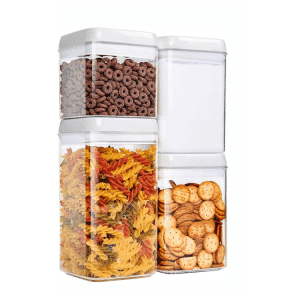Choosing the right food storage containers plays a vital role in keeping food fresh, safe, and minimizing environmental impact. The variety of materials, sizes, and designs available can make selecting the ideal container overwhelming. Understanding the key considerations of sustainability, freshness, and safety will help in making informed decisions about food storage solutions.
- Material Choices and Sustainability
Sustainability is a growing concern, and the material of food storage containers is a key factor. Glass containers are often preferred for their eco-friendly properties, as they are durable and recyclable. Stainless steel is another sustainable option, providing long-lasting performance.
For those looking to reduce plastic waste, opting for alternatives like bamboo or glass helps lessen the environmental impact. In regions like food storage containers South Africa, consumers are increasingly seeking eco-friendly options that align with sustainability goals.

- Ensuring Food Freshness
Keeping food fresh is a priority for any household or business. Airtight containers help preserve freshness by preventing air and moisture from entering. Look for containers with secure lids that seal tightly, as these are effective for storing perishables like fruits, vegetables, and leftovers. Glass containers are excellent for retaining flavors without absorbing odors.
- Safety Considerations in Food Storage
Safety is a crucial factor when choosing food storage containers. Glass containers are considered safe for food as they are non-toxic and do not leach chemicals, even when exposed to high temperatures. Some plastic containers, however, can release harmful substances when heated.
When opting for plastic, choose BPA-free options to ensure that food remains uncontaminated. In food containers South Africa, many consumers are switching to BPA-free or glass alternatives to ensure their food is stored in safe, non-toxic materials.
- Size and Storage Needs
Size is another important consideration when selecting food storage containers. Opting for a variety of sizes helps in organizing different types of food efficiently. Small containers are ideal for snacks or leftovers, while larger containers work well for meal prep or bulk storage.
- Versatility and Durability
Food storage containers should offer versatility to handle various storage needs, from freezer to microwave use. Glass containers, in particular, are versatile as they are both microwave and oven safe.
For those who need lightweight, portable containers, plastic options can be more convenient but should still be durable to withstand daily use. Investing in quality, long-lasting containers reduces the need for frequent replacements and supports a more sustainable lifestyle.
- Maintenance and Cleaning
Ease of cleaning is a key factor in maintaining food storage containers. Glass containers are generally dishwasher safe and do not stain or retain odors. Plastic containers, on the other hand, may require more careful cleaning, especially when used to store oily or highly pigmented foods.
Conclusion
Selecting the right food storage containers requires a careful balance between sustainability, freshness, and safety. Glass, stainless steel, and BPA-free plastics offer a range of options to suit individual needs.
By choosing durable, airtight containers, consumers can ensure food remains fresh and safe while reducing environmental impact. Whether in the home or commercial kitchen, making informed decisions about food storage supports healthier, more efficient living.
